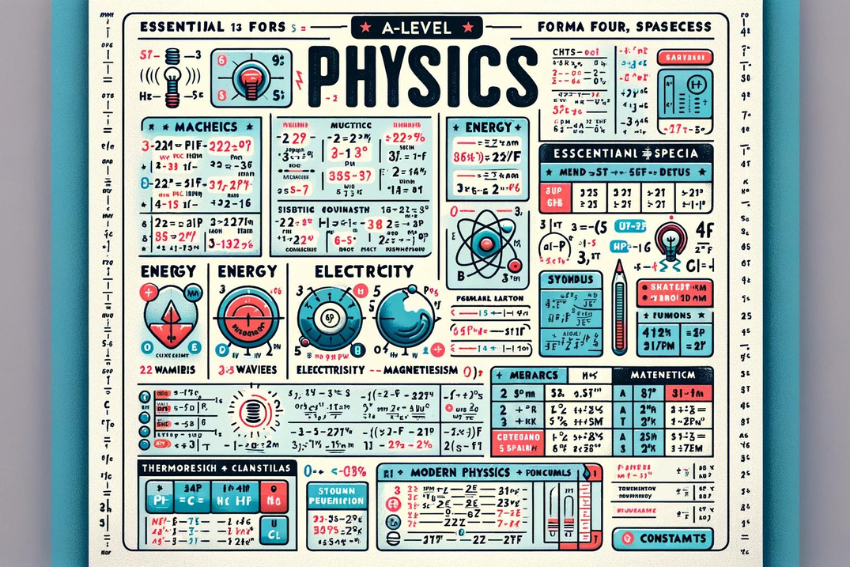Why is A-level Physics Worth Pursuing?
Before we go into detail about the difficulty level for this particular A-level subject, it’s important to answer a few questions. Students considering choosing A-Level Physics are often bothered with the question if A-Level Physics is hard. Despite its reputation for difficulty, A-level physics remains a highly rewarding subject, providing a robust foundation for a range of future academic and career pursuits, which should be a pretty big consideration when weighing options.
A-Level Physics Pass Rates
A great measure of difficulty for A-level exams are the pass rates – how people who choose to study this subject end up doing. The pass rates for A-Level Physics offer insight into its challenging nature. With a pass rate hovering around 95%, slightly lower than the average for A-Levels, it’s evident that achieving success in A-Level Physics demands dedication and understanding. This pass rate reflects not only the complexity of the material but also the rigorous assessment standards.
People also often ask if A-level Physics exam is harder than maths, the short answer is yes. If we look at numbers, more people get an A* in A-level maths than in physics and the pass rate is also higher by 0.20%.
A-Level grades for students in England in 2022 are:

Physics Pass Rate: 97.60%
Why is A-Level Physics So Difficult?
Several factors contribute to the perceived difficulty of A-Level Physics. Here is a list with just a few of them, so that you can keep them in mind.
1. Introduction of New, Complex Topics
Unlike the AS-level, which expands on GCSE subjects, A-Level Physics introduces entirely new topics that students have not encountered before. These include challenging areas like Quantum Physics and Particle and Nuclear Physics, which are more abstract and rely on understanding the experiments of former scientists rather than hands-on experience in labs.
2. Increased Depth of Study
A-Level Physics delves into subjects in significantly more detail compared to the GCSE level. Each learning objective in the A-Level syllabus covers a higher density of content, meaning that there’s more to learn within each topic.
3. Demanding Mathematical Skills
Approximately 40% of the A-Level Physics exam focuses on mathematics, requiring students to have a solid grasp of mathematical concepts. This integration of complex maths into physics makes the subject particularly challenging for those who may not be as strong in mathematics.
4. Rigorous Assessment Standards
A-Level Physics exams are known for their difficulty, including complex questions that involve multiple calculations and parts. Unlike GCSE level exams, A-Level questions do not follow a set structure, which means students must be adept at adapting to a variety of question styles and complexities.
Clear communication is key when tackling these types of questions. Many students find that subjects like A-Level English Literature help build essential skills in structuring arguments, analysing information, and writing clearly under pressure. These abilities often translate well into subjects like Physics, especially when it comes to extended written responses.
5. High Expectations for Practical Skills
In addition to theoretical knowledge, A-Level Physics demands a strong practical skill set. Students are required to complete and document various experiments, adhering to scientific methods. This practical component adds another layer of complexity to the course.
6. Emphasis on Deep Understanding Over Memorisation
A-Level Physics shifts away from the rote memorisation that might have been sufficient at the GCSE level. It requires a deep understanding of concepts and principles, challenging students to think critically and apply their knowledge to new situations.
Tips on How to Revise A Level Physics
Effective revision is key to mastering A Level Physics revision. Here are some tips:
- Utilise A Level Physics Formula Sheets – Familiarity with formulae is crucial. Regularly referring to a formula sheet can help embed these equations in your memory. This is especially important for complex topics like the energy equation in physics, which appears frequently in exams and requires both conceptual understanding and mathematical skill. for GCSE students for instance, using formulae sheet is the one thing everyone recommends.
- Practice with Past Papers – Engaging with A-level physics past papers can provide valuable insight into the exam format and question styles.
- Seek Help from A-Level Physics Tutors – Personalised guidance from a A-level physics tutor can be invaluable, especially for complex topics.
- Understand Rather Than Memorise – Focus on understanding the underlying principles rather than rote memorisation.
- Regular Revision Sessions – Consistent and spaced-out revision sessions help in better retention of concepts.
Wrap Up
While A-Level Physics is undoubtedly challenging, with questions like “What is the hardest thing in A-Level Physics?” or “Is it hard to get an A* in physics?” frequently asked, its rewards are manifold. It not only equips students with problem-solving skills and a deep understanding of the physical world but also opens doors to a range of academic and career opportunities in fields like engineering, computing, and even law. Embracing its challenges with the right approach can make A-Level Physics not just manageable but immensely fulfilling.








